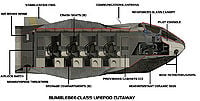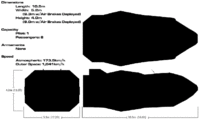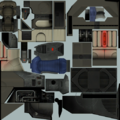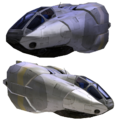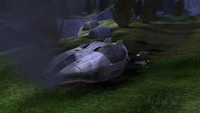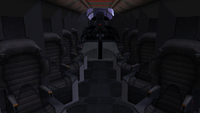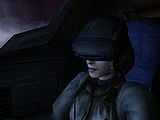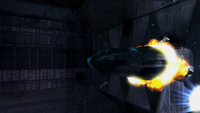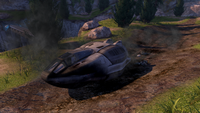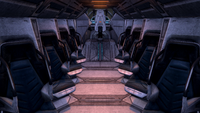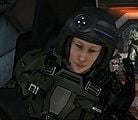SKT-9 Bumblebee
From Halopedia, the Halo wiki
| SKT-9 Bumblebee | |
|---|---|
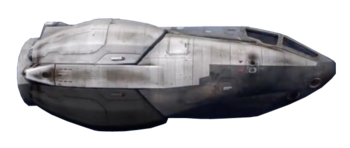
| |
| Production information | |
|
Manufacturer: |
|
|
Class: |
Lifeboat shuttle[1] |
|
Role: |
|
| Technical specifications | |
|
Length: |
|
|
Width: |
|
|
Height: |
4.1 meters (13.3 ft)[1] |
|
Mass: |
12.7 metric tons (14 tons)[1] |
|
Slipspace drive: |
None |
|
Crew: |
|
| Chronological and affiliation | |
|
Affiliation: |
|
The SKT-9 Bumblebee,[5] formally known as the Class-3 Enclosed Heavy Lifeboat, Controlled,[2] is a variant of the UNSC lifeboat commonly known as the Bumblebee.[1][6] It is a sixth-generation lifeboat, and features a pilot-operated guiding system similar to that of SKT-13 and SKT-21 shuttlecrafts.[2]
Overview[edit]
Design details[edit]
The SKT-9 Bumblebee is a medium-endurance (Class 3) vehicle;[1] it is well-armored, though Jacob Keyes once considered the possibility that a 12.7x40mm round may penetrate the relatively thin hull.[7] The SKT-9 are typically found onboard UNSC cruisers,[2] which carry several sets of them, stationed at designated airlocks. Several SKT-9 Bumblebees were also carried aboard Cairo Station.[5] The docking ports for Bumblebees are comparable in size to the Brhi Xur-pattern Leech boarding craft used by the Covenant, allowing the Covenant to use the airlocks to conduct boarding actions on UNSC spacecraft.[8]
Like Pelican and other dropships, each Bumblebee has a call sign, usually consisting of three letters from the phonetic alphabet, followed by a two-digit number.[9] SKT-9 Bumblebees are equipped with beacons,[10] and possess limited visual and audio capture capabilities.[11]
The SKT-9 can hold up to nine people (including the pilot), and it has enough supplies to support 126-person-days of life support.[1] It has one pilot seat as well as eight side-facing crash seats. The seats have harnesses to keep passengers from injury when crash-landing.[3][4] Though they are noted as being one of the safer methods of UNSC ship evacuation,[2] the effectiveness of the safety features on this Bumblebee vary greatly, as can their reliability. During the Battle of Installation 04, some of these Bumblebees landed without any injuries to their passengers, while others suffered catastrophic failures while in mid-air, resulting in the deaths of most, if not all, aboard upon impact.[10]
The SKT-9 Bumblebee employs thrusters and air-brakes to slow down during descent.[2] Although it has a pilot control station,[1][12] the Bumblebee has little in the way of maneuverability, as it is not intended for extended atmospheric use, nor are its thrusters powerful enough to escape a planet's atmosphere;[3][4] while onboard one, Jacob Keyes thought that his Bumblebee lifeboat "flew like a rock".[9] Instead, the lifeboat uses a simple escape-and-evasion autopilot routine after boosting away from its host vessel.[1][12] Once it enters atmosphere, the Bumblebee makes a controlled crash landing with aerobraking panels and drogue chutes.[1] Thus, after a landing, the lifeboat can never be used again, as the air brakes disengage upon descent; the lifeboat would have likely suffered a great amount of damage as well.[3][4]
There may be some animosity between Bumblebee pilots and Pelican pilots; during the Battle of Installation 04, Carol Rawley noted she would rather die piloting her own Pelican than trust her fate to "some lifeboat jockey".[7]
Known SKT-9 Bumblebees[edit]
Operational History[edit]
The Halcyon-class light cruiser UNSC Pillar of Autumn carried eighteen of these Bumblebees. Most of them were used to evacuate the vessel when it was shot down during the Battle over Installation 04 on September 19, 2552.[10] At least one was destroyed by the Covenant when it was ejected from the vessel,[8] while at least six made landfall on the ring.[9][10] In the final stages of the conflict, John-117 originally intended to take one of the remaining lifeboats on the Autumn to escape from the ring's destruction.[13][14]
Production notes[edit]
- When the Master Chief's lifeboat launches in Halo: Combat Evolved, its rear hatch remains open. This was rectified in Halo: Combat Evolved Anniversary.
- In Halo: Custom Edition, Bumblebees can be modded into maps. They have closed rear hatches until a player pilots them, at which point the hatch opens. As Bungie only designed these for cutscenes, it is likely to allow for the doors opening or closing during the final cutscene on The Pillar Of Autumn.
- There is an Easter egg underneath the pilot's seat with text that reads "put your head 'teen your legs & kiss your ass good bye!".[15]
Gallery[edit]

|
Browse more images in this article's gallery page. |
Halo: Combat Evolved[edit]
A Bumblebee entering the atmosphere of Installation 04.
Halo: Combat Evolved Anniversary[edit]
Ä Bumblebee ejecting from an airlock on UNSC Pillar of Autumn.
Bumblebee LFA-43 escapes the Autumn at the onset of the Battle of Installation 04.
List of appearances[edit]
- Halo: The Fall of Reach (First appearance)
- Halo: Combat Evolved
- Halo: The Flood
- Adjunct (Mentioned only)
- Halo: Ghosts of Onyx (Mentioned only)
- Halo: Evolutions - Essential Tales of the Halo Universe
- Halo: Combat Evolved Anniversary
- Halo Mythos
- Halo: Empty Throne
Sources[edit]
- ^ a b c d e f g h i j k l m n o p q Halo Encyclopedia (2022 edition), page 153
- ^ a b c d e f g h i j Halo: Combat Evolved Anniversary, Library: Bumblebee
- ^ a b c d e Halo Encyclopedia (2009 edition), page 250
- ^ a b c d e Halo Encyclopedia (2011 edition), page 260
- ^ a b Halo: Warfleet, page 30
- ^ Bungie.net, Bungie Weekly Update of 04-13-01
- ^ a b Halo: The Flood, chapter 1
- ^ a b Halo: Combat Evolved, campaign level The Pillar of Autumn
- ^ a b c Halo: The Flood, chapter 2
- ^ a b c d Halo: Combat Evolved, campaign level Halo
- ^ Halo: The Flood: Adjunct
- ^ a b Twitter, Halo (@Halo): "The SKT-9 Bumblebee is a heavy lifeboat that can hold up to eight passengers and has a pilot control station, though by default it uses a simple escape-and-evasion autopilot routine after boosting away from its host vessel. #FictionFriday"
- ^ Halo: Combat Evolved, campaign level The Maw
- ^ Halo: The Flood, chapter 12
- ^ Halo: Combat Evolved, Bumblebee interior texture

